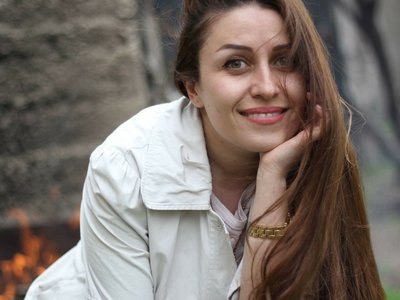

The focus groups were organized and facilitated in conjunction with the project coordinators. As a result two focus groups with students and with the projects Stakeholder Committee—a committee in which selected organic sector stakeholders including existing and potential organic educators give frequent feedback and also participate in the development of the Organic Master Program’s curriculum at the Armenian National Agrarian University (ANAU)—were conducted.
The first focus group with students at ANAU, centered on the curriculum of the Organic Agriculture Master's Programme that is currently being developed with participation of organic stakeholders within the framework of the APPEAR project Building Organic Agriculture in Armenia; Improving the knowledge and skills of organic stakeholders through participatory curriculum development and outreach | BOAA. The students came together to discuss also the participation process of curriculum making. These students contributed many ideas. Initial results of the focus group showed that they were excited about the start of a new educational programme and as one of them (who preferred to remain anonymous) said: ''It is a very saturated, well-designed and well-developed programme that includes all the necessary subjects.'' From the answers concerning preferred learning methods we have learnt that students really suffer from current teaching methods and find them boring and useless. They would like to experience more interactive classes with plenty of discussions and practical work. The aim is to consider all opinions in the programme development due to its commitment to a participatory approach. After the curriculum has been developed the next phase of the project is advertisement and dissemination to potential students. Hasmik believes that the master’s programme does not need much advertisement, as it is unique to Armenia due to the methods used in developing it and because of its popularity with current students. Together with the students she was proud to be a pioneer of the process of participatory curriculum making. One positive outcome from the focus group was that more participants showed up than expected, as they told their friends about it and they also decided to come. Another positive outcome was that one of the students, Rima Karapetyan, wrote about the workshop in the University's local newspaper.
The second focus group took place with BOAA’s Stakeholder Committee. Together farmers, producers, students, professors, certification organization representatives and researchers shared their understanding of possible ways the University and the agrarian sector of Armenia could collaborate. Participants shared their ideas through brainstorming, as well as telling about their own successful experiences. In addition to these focus groups, Hasmik assisted and observed the project’s training in September provided by a group of BOKU professors and lecturers. At the end of September Hasmik had a public presentation for ANAU lecturers and students sharing her experiences about Austrian higher education system and also organic farming best practices in Austria.
Hasmik would like to thank: the project coordinator from the Armenian side Astghik Sahakyan and project coordinator from the Austrian side Milena Klimek-for their contributions; ANAU professors and project members Sasun Mamajanyan, Narine Hovhannisyan-for impressing students to participate and contacting them and BOKU Professor Bernhard Freyer-for continuous support.
Hasmik Hovakimyan is a doctoral candidate at the Division of Organic Farming at the University of Natural Resources and Life Sciences, Vienna (BOKU). She received an APPEAR scholarship for studies in Austria. Her PhD research is linked to the APPEAR funded project “Building Organic Agriculture in Armenia; Improving the knowledge and skills of organic stakeholders through participatory curriculum development and outreach | BOAA”. Her research is focused on the participatory approach to curriculum development in higher education in Armenia, using organic farming as an example. She graduated from the Armenian State University of Economics (ASUE) in 2010 and has a Master’s degree with an honorary diploma. She has more than 7 years of work experience in different state organizations in Armenia, as well as experience in teaching at ASUE.
